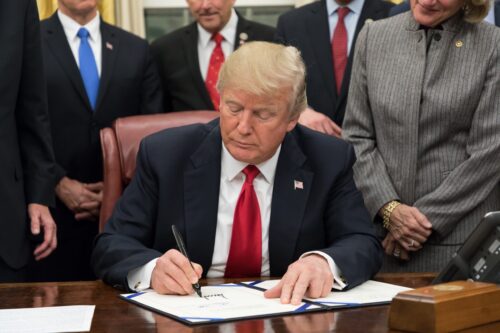Article • Dean Baker’s Beat the Press
Negotiating with Trump on Taxes (Tariffs) is a Fool’s Game

Article • Dean Baker’s Beat the Press
Fact-based, data-driven research and analysis to advance democratic debate on vital issues shaping people’s lives.
Center for Economic and Policy Research
1611 Connecticut Ave. NW
Suite 400
Washington, DC 20009
Tel: 202-293-5380
Fax: 202-588-1356
https://cepr.net
Trump seems set to go through with his plan to make April 2 “Tax Day,” when he hits working people with one of the largest tax increases ever. There is discussion in the media that the countries whose exports are being taxed still hope to negotiate an arrangement where the taxes may be reduced or delayed. This is not likely to be an effective strategy.
It should be very clear at this point that Donald Trump is not a person who feels bound by either his commitments or reality. Even before Trump took office, he began aiming his guns at Canada and Mexico, our close allies, neighbors, and trading partners.
He complained about massive flows of fentanyl and illegal immigrants into the United States. Both stories were crazy in reference to Canada. The flow of fentanyl into the U.S. is trivial by all accounts and very few people cross the Canadian border illegally.
In the case of Mexico, the government has long been cooperating with the U.S. on immigration. Its government made arrangements with both Trump in his first term, and then more recently with Biden, to restrict immigration flows. It’s not clear what Trump hoped to accomplish with tariff threats that he couldn’t have gotten through normal negotiations.
The fentanyl flows are more real, but there is no magic wand to eliminate illegal drug trafficking. If there were, presumably Trump would use it here. The Mexican government has always indicated a willingness to cooperate on this issue, if there is some clear request they could deal with.
The other part of the story is the U.S. trade deficit with these countries, which Trump blamed on trade deals negotiated by morons. The trade deal currently in place between Canada, Mexico, and the United States is the United States, Mexico, and Canada Agreement (USMCA), which was negotiated by Donald Trump in his first term.
Apparently, Trump is no longer happy with his work. The fact that he committed the United States to the deal means nothing to him, just as his promises to pay contractors with his businesses also often meant nothing.
While it’s clear Trump doesn’t feel bound by his commitments, he also sees little need to care about reality. He has repeatedly claimed that the United States has a $200 billion trade deficit with Canada. The actual figure is close to $60 billion.
Furthermore, this deficit is all due to U.S. imports of oil from Canada. Trump himself sought to promote these imports in his first term, pushing to get the Keystone Pipeline constructed to increase oil flows. Apparently, Trump is now angry at Canada for selling us oil.
This is important background for U.S. trading partners who may be looking to negotiate with Trump to persuade him to reduce the taxes he is imposing on their exports to the United States. Trump is not going to feel bound by any deal that he makes. He may agree to reduce the taxes today, but next week, there could be some real or imagined complaint that causes him to reverse course.
And it is important to recognize the sort of absurd complaints that could cause Trump to impose a big tax hike. Last week, Trump fumed on his social media site about a portrait of him hanging in the legislature of the state of Colorado. Trump claimed that the portrait was commissioned by the state’s Democratic governor, Jared Polis, to make him look bad.
In fact, the portrait was actually commissioned by a group of Trump supporters in the state who raised $10,000 through a GoFundMe drive. This is the sort of thing that the president of the United States obsesses about, and could cause him to take back any commitments on tariffs. Imagine if France’s president was caught on a hot mic making jokes about Trump’s hair or makeup. That should be good for 20 percent tariffs.
The other possibility is that even after a Trump trade deal a country continued to run a large trade surplus with the United States, as is the case now with Canada and Mexico. Trump will undoubtedly denounce the trade deal negotiated by morons and demand a new one.
In short, other governments need to recognize they don’t have a normal negotiating partner with Donald Trump. Any deal for lower tariffs may buy them a week or a month, or perhaps longer, but only a fool would treat it as a long-term commitment. Long-term commitments do not exist in Trump-world, and everyone should know this.